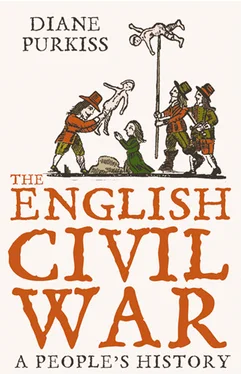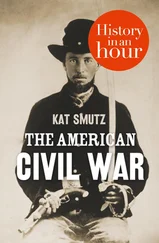Historians have disagreed violently about whether the rioters were motivated solely by religion, or whether class hatred played a part too. For many in the swirling, angry crowds, the war was, precisely, a war on the papists, and the goal was to prevent them from carrying out the hideous designs they were believed to be nurturing. In its paranoia this enabling narrative of recruitment does strongly resemble Nazi anti-Semitism, and like Nazi anti-Semitism it could easily tip over into corruption, profiteering and simple looting. Unlike anti-Semitism, however, it was elastic, able to embrace people (ultimately including Charles himself) who were clearly not Catholic nor even particularly sympathetic to Catholicism, but who were not godly enough, who did not share the culture and aspirations formed among the godly and the indefatigable tellers of their story, the London press. People who said ‘damme me!’ or ‘sinke me!’, people who fought alongside the Royalists or supplied them willingly, could come to be seen as near-papist because they were assumed to be part of a vast and secret conspiracy or else the dupes of that conspiracy. As well, England was swayed by rumours of prominent conversions; Laud was said to have been present when ‘Doctor Prince’ received extreme unction; an Essex man thought most of the bishops were secret Catholics; Suffolk parishioners began to suspect their ministers of Catholicism. Fears centred on the queen; at Bures a local gentleman said that ‘the king hath a wife, and he loves her well, and she is a papist and we must all be of her religion, and that’s the thing the bishops aim at’.
But many of those accused of popery were merely Arminian or not sufficiently godly to abhor Laud’s reforms. No one even knew how many Catholics there were in the Eastern Association, and as some of the stories above make clear, locals were not always sure about who counted as Catholic; there were probably only 30,000 Catholics in the whole country, in a population of around four million. But prejudice was deaf to statistics. The queen’s activism and the Laudian reforms made it seem that Catholics were gaining in strength. So did the rising number of Catholic peers: in 1603, there were nine, and in 1625 eighteen; the number of active, visible priests rose too, and Jesuits went from nine in 1593 to around 180 by 1641. The people of Essex and Suffolk had no direct knowledge of these alarming statistics, but they may have picked up a general and accurate sense that Rome was on the rise.
Dreadful as it seemed for Countess Rivers, worse fates awaited others. In Dorchester, in August 1642, two Catholic priests disobeyed a royal proclamation of 8 March 1641 which had tried to placate the public by insisting that all priests leave the country. They were arrested; one recanted, and the other refused to do so. His name was Hugh Green, and he was fifty-seven years old. He had been making for the ports to try to leave the country when he was arrested by a customs officer. He spent five months in gaol, was tried and convicted.
Green was to be executed on a Friday, by his own desire. They brought the furze for the fires to Gallows Hill, outside Dorchester, on Thursday. Green himself was taken to Gallows Hill on 18 August 1642. A crowd was waiting for him. It was eager and hopeful; after the terror of the Irish, after all Pym had said, it seemed obvious to the spectators that traitors like this one were behind it all. Three women were being hanged, too, for various crimes, and two had sent him word the night before that they would die in his faith. He absolved them with a sign, because he wasn’t allowed close to them. ‘God be with you, sir!’ they cried.
Green gave away his things – his beads, his crucifix, his Agnus Dei, his handkerchief, his book of litanies. However, he would not apologize for what everyone knew to be his treachery. He made a long speech, denouncing heresy. Sir Thomas Trencher’s chaplain, who had once been a weaver, was angry, shouting ‘He blasphemes. Stop his mouth!’ So the sheriff told Green to stop. Then he prayed instead for unity, for peace, and for the king, and forgave everyone. He called a Catholic woman, Elizabeth Willoughby, to him and she came, and he asked her to say goodbye to his fellow-prisoners, and he blessed her and five others.
He prayed for half an hour. No one could be persuaded to turn the ladder and make him fall. Finally, the hangman, sitting astride the gallows, persuaded a country clown to turn the ladder, and Green dropped. He made the sign of the cross three times. And they cut him down with a knife at the end of a long stick, handed up to the hangman by a constable, ‘although’, said Elizabeth, ‘I and others did our uttermost to have hindered him’. Their courage was wasted. ‘The man that was to quarter him was a timorous, unskilful man, by trade a barber, and his name was Barefoot. He was so long dismembering him that he came to his perfect senses and sat upright.’ Elizabeth Willoughby managed to write down her horror:
Then did this butcher cut his belly on both sides, and turn the flap upon his breast, which the holy man feeling put his left hand upon his bowels, and looking on his bloody hand laid it down by his side, and lifting up his right hand he crossed himself, saying three times, Jesu, Jesu, Jesu Mercy! The which, although unworthy, I am a witness of, for my hand was on his forehead … all the Catholics were pressed away from him by the unruly multitude except myself … Whilst he was thus calling upon Jesus, the butcher did pull a piece of his liver out instead of his heart, and tumbling his guts out every way to see if his heart were not among them; then with his knife he raked in the body … Methought my heart was pulled out of my body to see him in such cruel pains, lifting up his eyes to heaven, and not yet dead. Then I could no longer hold, but cried, Out upon them that did so torment him. His forehead was bathed in sweat, and blood and water flowed from his eyes and nose. And when on account of the gushing streams of blood his tongue could no longer pronounce the saving name of Jesus, his lips moved, and the frequent groans which he uttered from his inmost heart were proof of the most bitter pain and torture which he suffered.
Hugh Green lingered in the hands of the local barber for half an hour or more. When another Catholic woman pleaded with the sheriff, he was finally put out of his agony. After he had died at last, his heart was cut out and held up on a spear point, then flung into the fire where a minute before, his genitals had been burned. Some Catholic bystanders, including Elizabeth, tried to take the torn body away for burial, but the crowd stopped them, angrily, and it was all Elizabeth could do to get home without being torn to pieces herself.
Then Green’s head was cut off, too, and the crowd kicked it about like a football. As a football, in fact; they went on playing till four o’clock – which proved that the man had no power – but since they believed Catholics were in league with the powers of darkness, they put sticks in the eyes, nose, and mouth, and buried the head near the scaffold. They had thought of putting it on one of Dorchester’s gates as a trophy and a warning, but they had been put off, Elizabeth said, because a previous priest had been so displayed and God had punished the town with the onset of plague.
Others suffered the same fate. In July 1641, a Douai priest named William Ward who had spent twenty years in prison was suddenly dragged off to be hanged at Tyburn. In December, Parliament wanted to hang another seven priests. Charles refused the petition – courageously, if rashly, given that half the nation was by now wondering if he was not a papist himself – but two more priests were nonetheless executed in January 1642, and another seven in 1642 alone. Parliament, when ruling alone, went on to put to death twenty-four priests between 1641 and the end of the First Civil War, simply because they were priests. Eager claims for Parliamentarian tolerance and enthusiasm for liberty were liable to skate over the horrible deaths of these men, victims of a holy crusade and a paranoid terror that had little to do with liberal values. Rather, the English Civil War would not have occurred without the hysterical dread of popery which provoked the kind of violence Lady Rivers and Hugh Green experienced. Liberty was what had to be defended from papists like them, by truly godly people. In this way, a nation came to define itself against some of its own citizens. Civil war was bound to follow.
Читать дальше












